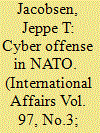| Srl | Item |
| 1 |
ID:
178083


|
|
|
|
|
| Summary/Abstract |
As a response to the Russian invasion of Crimea, NATO returned to the core military concepts of deterrence and collective defence. This NATO adaption has recently come to include attempts to integrate offensive cyber effects into NATO force structure and response doctrine. The article argues—counter to what is publicly declared—that such an integration does little to strengthen NATO's deterrence posture and is unlikely to deter non-military, hybrid cyber activity below the threshold of collective defence. The article identifies several practical challenges to the current integration effort, which include the temporal dimension of developing exploits, battle damage assessment and deconfliction. With these challenges in mind, the article suggests that deploying minor and less resourceful cyber effects that cause persistent ‘cyber annoyances’ holds an unappreciated potential as they can drain opponent resources, disturb vital IT-systems and complicate decision-making. The article ends by arguing that NATO should not adapt its collective defence clause to cyberspace. A more active NATO in cyberspace risks undermining the cyber-intelligence norm that so far has prevented escalation and thereby increasing the likelihood that Russia misinterprets intelligence and active cyber defence activities as military preparation, armament or an attack in the making.
|
|
|
|
|
|
|
|
|
|
|
|
|
|
|
|
| 2 |
ID:
176495


|
|
|
|
|
| Summary/Abstract |
Edward Snowden exposed the discrepancy between the official US defence discourse of liberal values in cyberspace and secret surveillance and cyber exploitation practices. Situated in the critical literature on security and surveillance, the article proposes that more attention needs to be paid to the constitutive role of transgressive practices for security communities. The article introduces a Lacanian strategy for studying transgression in the US cyber defence community. Through this strategy, a transgressive other – in this case, China in cyberspace – enters the fantasy of the US cyber defence community as the symptom that conceals more fundamental tensions in the US cyber defence. But the community's representation of China in cyberspace represents more than that; China is a fantasmatic object that structures and gives content to a desire for transgressing the official ideals of the US cyber defence. This is why the excessive cyber practices that China is criticised for conducting mirror the secret, disavowed transgressions of the US cyber defence. Transgressions, the article concludes through Lacan, provide the necessary (partial) enjoyment that sustains the US cyber defence community as a solidarity-in-guilt and the official US cyber defence discourse.
|
|
|
|
|
|
|
|
|
|
|
|
|
|
|
|
| 3 |
ID:
173363


|
|
|
|
|
| Summary/Abstract |
How do public protests emerge and become impotent? Inspired by Žižek's ideology critique, the article examines the ideological underpinnings of contemporary public-private security governance and suggests that worried, complaining subjects are a product of a dominant discourse of expert knowledge and technification. It then introduces three Žižekian dynamics that prevent protests from challenging the prevailing discourse – particularisation, ultra-politics, and cynicism – and illustrates these dynamic through a case study of the history of public complaints about Facebook. The article suggests that Facebook communicates through a discourse of technification whereby it constantly invents technological fixes unable to satisfy the complaints. The article further suggests that Facebook turning into a national security partner in the fight against terrorism online prevents complaints from becoming universalised by rendering even particularised privacy contestations illegitimate. This is reinforced, the article argues, by the subject's cynical enjoyment; that is, the ‘letting off steam’ on Facebook while criticising it.
|
|
|
|
|
|
|
|
|
|
|
|
|
|
|
|